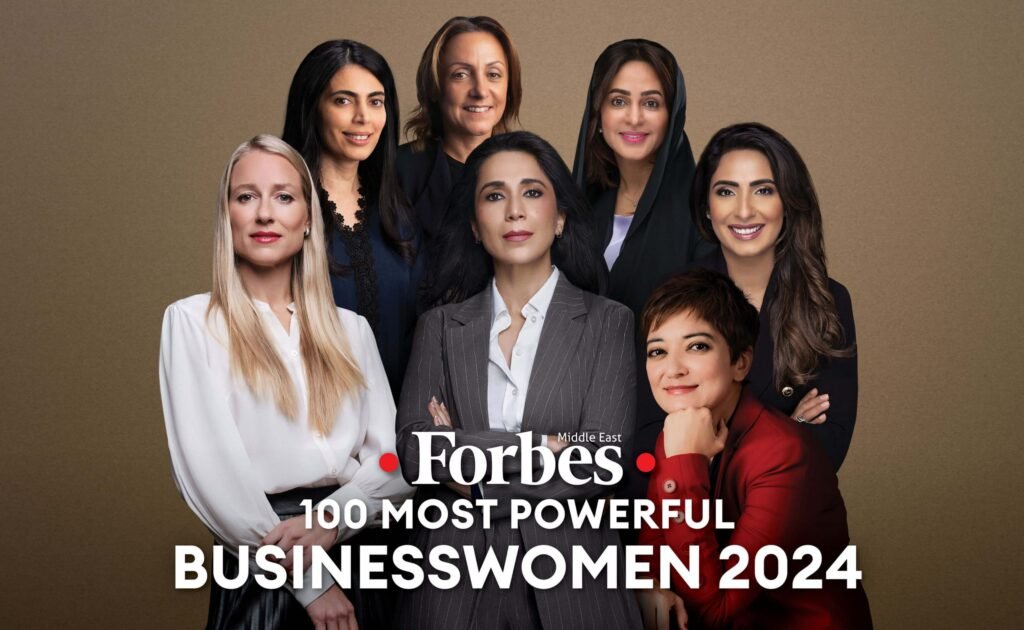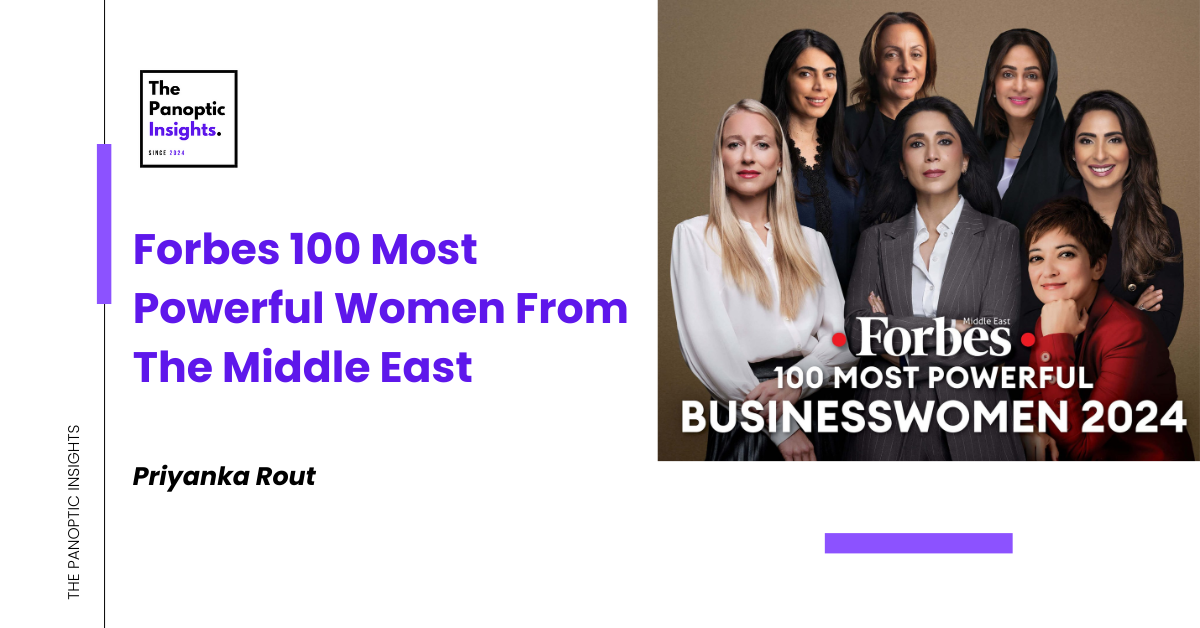Table of Contents
Let’s Get Started!
Forbes Middle East just released its yearly list of Forbes 100 Most Powerful Women in 2024. These women are leading the charge for a better future in business. They were chosen based on their business size, impact, achievements, and their efforts in areas like corporate social responsibility. Family business leaders didn’t make the cut this time.
Hana Al Rostamani, the Group CEO of First Abu Dhabi Bank (FAB), is at the top spot for the second year in a row. She’s been making waves globally, ranking on Forbes’ World’s Most Powerful Women list last year. Joining her in the top three are Shaikha Khaled Al Bahar from NBK Group and Wadha Ahmad Al-Khateeb from KNPC.
This year’s list includes 100 remarkable women from 27 different fields and 28 countries. Egypt leads the pack with 17 women, followed closely by the UAE with 14. Banking and finance are the most represented sectors, followed by healthcare. There are also 35 newcomers this year, showing the growing diversity of leadership.
Some newcomers have made a big splash, like Dana Nasser Al Sabah from KIPCO, Shazia Syed from Unilever, and Reem Asaad from Cisco, who all made it into the top 10 for the first time. Half of the top 10 are from banking and finance, and two Pakistani leaders are representing diversity in the region’s leadership.
What Is The Ranking Methodology For Listing Forbes 100 Most Powerful Women?

In making the ranking, Forbe’s took into account several factors:
- How much the leader has influenced the region and the markets they operate in.
- The leader’s accomplishments and performance over the past year.
- The extent of their involvement in sustainability and corporate social responsibility initiatives.
- Their job title.
- The scale of their business in terms of revenue, assets, market value, and workforce size.
- The leader’s years of experience in the industry and time in their current position.
- Family business leaders were not included in this year’s ranking.
Forbes 100 Most Powerful Women: The Top 10
| Rank | Name | Nationality | Position | Organization |
| 1 | Hana Al Rostamani | Emirati | Group CEO | First Abu Dhabi Bank (FAB) |
| 2 | Shaikha Khaled Al Bahar | Kuwaiti | Deputy Group CEO | National Bank of Kuwait Group (NBK Group) |
| 3 | Wadha Ahmed Al-Khateeb | Kuwaiti | CEO | Kuwait National Petroleum Company (KNPC) |
| 4 | Shaista Asif | Pakistani | Cofounder and Group CEO | PureHealth Holding |
| 5 | Dana Nasser Al Sabah | Kuwaiti | Group CEO | Kuwait Projects Company (Holding) – KIPCO |
| 6 | Randa Sadik | Jordanian | CEO | Arab Bank |
| 7 | Sarah Al-Suhaimi | Saudi | Chairperson | Saudi Tadawul Group |
| 8 | Maryam Al Suwaidi | Emirati | CEO | Securities and Commodities Authority (SCA) |
| 9 | Shazia Syed | Pakistani | General Manager – North Africa, Levant, and Iraq & Arabia Senior Customer Development Lead | Unilever |
| 10 | Reem Asaad | Egyptian-American | Vice President – Middle East, Africa, Türkiye, Romania & The Commonwealth of Independent States (CIS) | Cisco |
Click here to view the full list of the Middle East’s 100 Most Powerful Businesswomen 2024.
Common Themes and Trends In Forbes 100 Most Powerful Women List
Looking closely at the Forbes list, we see some important stuff about women in the Middle East. One big thing is that more and more women are getting into jobs that used to be just for men, like finance, tech, and engineering. Also, many of these women are using their influence to help with things like making things fairer for women, getting more education, and improving healthcare. This shows how making money and making society better can go hand in hand.
Beyond the Forbes 100 Most Powerful Women List
The Forbes 100 Most Powerful Women list is cool, but it’s not everything. There are lots of powerful women in the Middle East doing amazing stuff that doesn’t always get noticed. They’re doing things like starting community projects, helping people, and speaking up for important issues. Even though they might not be on a fancy list, they’re still making a big difference. And the list itself gets people talking about gender equality, which is important for making real change happen.
Challenges and Opportunities Ahead
Even though women in the Middle East are doing well in some ways, there are still big challenges. Things like rules, culture, and how people think about men and women can make it hard for women to succeed. But there’s also a chance for everyone to work together and find new ways to make things better. By sticking together and being creative, women and their supporters can make sure everyone has a fair shot at success.
Let’s Wrap Up!
The Forbes 100 Most Powerful Women list shows us how awesome women in the Middle East are doing. They’re leading the way and inspiring others to do great things too. But we can’t forget that there’s still work to do to make sure everyone, no matter their gender, has the chance to shine. Let’s keep supporting each other and fighting for fairness, so everyone can make the world a better place.
FAQs
Who is the wealthiest woman in Saudi Arabia?
Lubna Suliman al-Olayan holds the title of the richest woman in Saudi Arabia. She’s a Saudi businesswoman who previously served as CEO and Deputy Chairman of Olayan Financing Company.
Who is the well-known female figure in Saudi Arabia?
HRH Princess Reema bint Bandar bin Sultan gained prominence as Saudi Arabia’s first ambassador to the United States. She focuses on empowering women and advocating for their rights, alongside her notable philanthropic efforts.
Who is the youngest princess in Saudi Arabia?
Basmah bint Saud bin Al Saud, a Saudi Arabian royal, businesswoman, and human rights activist, holds the distinction of being the youngest daughter of King Saud.

Can you be more specific about the content of your article? After reading it, I still have some doubts. Hope you can help me.